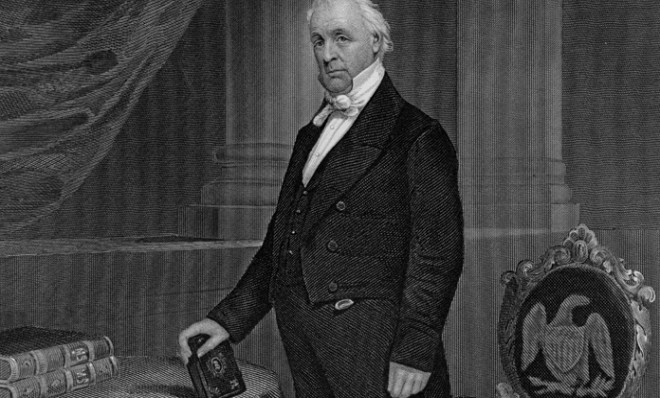Today in history: The birth of the bachelor president
James Buchanan was the only president who never married

A free daily email with the biggest news stories of the day – and the best features from TheWeek.com
You are now subscribed
Your newsletter sign-up was successful

April 23, 1791: James Buchanan was born. He was the 15th president, serving between 1857 and 1861. Buchanan was the only president who never married. He is considered to be one of the worst presidents, largely for his failure to prevent the Civil War.
In the late 1850s, as the North and South drifted further apart, Buchanan had an opportunity to heal the growing rift. But Buchanan relied on constitutional arguments — which tended to favor the South and angered the North; he also failed to grasp that other regional divisions were tearing political parties apart as well. The Democratic Party split; the Whigs were destroyed, giving rise to the Republicans.
Born in Pennsylvania, Buchanan was elected five times to the House of Representatives; then, after a short stint as ambassador to Russia, served a decade in the Senate. He became secretary of State under President James Polk and Ambassador to Britain under President Franklin Pierce. This time abroad insulated him from political fights an home, giving Buchanan the appearance of being above the fray. This helped him secure the 1856 Democratic nomination for the presidency.
The Week
Escape your echo chamber. Get the facts behind the news, plus analysis from multiple perspectives.

Sign up for The Week's Free Newsletters
From our morning news briefing to a weekly Good News Newsletter, get the best of The Week delivered directly to your inbox.
From our morning news briefing to a weekly Good News Newsletter, get the best of The Week delivered directly to your inbox.
As president-elect, Buchanan thought the crisis over slavery would go away if Americans would simply accept whatever the Supreme Court ruled on it. The court was considering the legality of restricting slavery in the territories, and two justices hinted to Buchanan what the decision would be. In his inaugural address, the new president thus referred to the territorial question as "happily, a matter of but little practical importance" since the Supreme Court was about to settle it "speedily and finally."
Two days later the court issued its famous Dred Scott decision, which said that Congress had no constitutional power to deprive persons of their property rights in slaves in the territories. Southerners were delighted, but the decision angered the North.
Buchanan decided to end the troubles in one territory, Kansas, by urging its admission to the Union as a slave state. But this angered not only Republicans but also members of the president's own Democratic Party. Kansas remained a territory.
When Republicans won control of the House in 1858, every significant bill they passed fell before southern votes in the Senate or a presidential veto. The federal government was stalemated.
A free daily email with the biggest news stories of the day – and the best features from TheWeek.com
Regional strife got so bad that in 1860 the Democratic Party split into northern and southern wings, each nominating its own candidate for the presidency. So when Republicans nominated Abraham Lincoln, it was a foregone conclusion that he would win, even though his name appeared on no southern ballot. Rather than accept a Republican administration, the southern "fire-eaters" advocated secession.
A dismayed President Buchanan denied the legal right of states to secede but acknowledged that the federal government could not stop them from doing so. He hoped for compromise, but secessionist leaders weren't interested.
A month after Buchanan left the presidency, the Civil War began. The nation's fate lay in the hands of its 16th president, Abraham Lincoln.
Quote of the day
"What is right and what is practicable are two different things." -James Buchanan
More from West Wing Reports...


